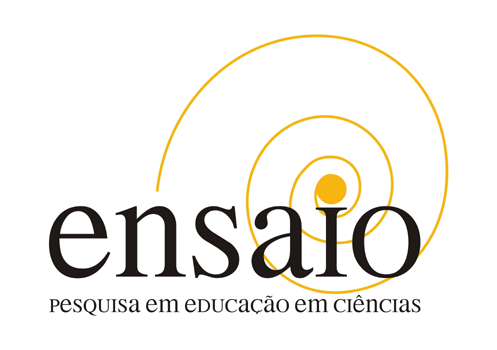Resumo:
Este artigo apresenta e discute um referencial para análise de episódios explicativos na sala de aula de ciências desenvolvido a partir de análises de contribuições teóricas nas áreas de Educação em Ciências, Linguística, Ciência Cognitiva, e de investigações empíricas envolvendo observação de aulas de ciências em escolas secundárias da região da Grande Londres. As categorias propostas relacionam: a criação de diferenças que motivam explicações, a construção das entidades da ciência no discurso; a re- contextualização de conhecimento e a atribuição de significação ao que é material, através de demonstrações. O potencial destes resultados é discutido no contexto de investigações em desenvolvimento.
Abstract:
This paper presents and discusses a theoretical framework for describing explanation in the science classroom. The proposed categories are based upon theoretical analyses of studies in Science Education, Linguistics, and Cognitive Science and on empirical investigations which involved the observation of secondary school science lessons in the London área. The result is a language of description of explanatory episodes which discusses: the creation of differences to motivate explanations, the construction of the entities of science in discourse; re-contextualisations of knowledge and; how demonstration puts meaning into matter. The potential of these results is discussed in the context of on going investigations.
Texto completo disponível apenas em PDF.
Full text available only in PDF format.
Referências bibliográficas
- ANTAKI, C. (1992) Explaining and Arguing Londres: Sage.
- ANTAKI, C. (Ed.) (1988). Analysing everyday explanation Londres: Sage.
- BHASKAR, R. (1978) A realist view of science New Jersey: Hassocks.
- EDWARDS, D. and MERCER, N. (1987) Common Knowledge: The Development of Understanding in the Classroom. Londres: Methuen/RoutIedge.
- HALLIDAY, M. A. K. and MARTIN, J. (1992) Writing Science; Literacy and Discursive Power Londres: Falmer Press.
- HALLIDAY, M. (1978) Language as Social Semiotic Londres: Arnold.
- HANSON, N. (1958) Patterns of Discovery Londres: Allen and Unwin.
- HANSON, N. (1972) Observation and explanation Londres: Allen and Unwin.
- HARRÉ, R. (1986) Varieties of Ftealism Oxford: Blackwell
- HARRÉ, R. e MADDEN (1977) Causal Powers Oxford: Blackwell.
- HODGE, R. and KRESS, G. R. (1988) Language as ideology Londres: Routiedge.
- JOHNSON, M. (1987) The Body in the Mind Chicago: Univ. of Chicago Press.
- KRESS, G. and VAN LEEUWEN, T. (1996) fíeading Images; the grammar of visual design. Londres: Routiedge
- KRESS, G.; MARTINS, I.; OGBORN, J.; MCGILLICUDDY, K. (1995) Visual Communication ín the Learning of Science An n uai Meeting of the European Science Education Research Association, 1, Roma.
- KRESS, G.;; OGBORN, J. JEWITT, C. e TSATSARELIS, C. (1998) Mutti-modai rhetorics of the science classroom Pre-print, Institute of Education University of London.
- LAKOFF, G. (1987) Women, fire and dangerous íhings: what categories reveal about the mind University of Chicago Press.
- LAKOFF, G. e JOHNSON, M. (1983) Metaphors we live by Chicago: University of Chicago Press.
- LEMKE, J. (1992) Taiking Science Nova Iorque: Ablex.
- MARIANI, M. C., OGBORN, J. (1995) The ontology of physical events; a comparison of two groups. International Journal of Science Education 17(5), 643-661.
- MARTINS, I.; OGBORN, J. (1997) Metaphorical reasoning about genetics. International Journal of Science Education vol.19,1,47-63.
- MARTINS, I.. (1998) Retórica e ensino de ciências? Encontro de Pesquisa em Ensino de Física, 6, Florianópolis, SC: Atas do VIEPEF
- MILLAR, R. e OSBORNE, J. (1998) Beyond 2000 King' s College London: School of Education (também disponível na URL http://www.kcl.ac.uk/education).
» http://www.kcl.ac.uk/education - OGBORN, J. (1994) Theoreticai and empirical investigations of the nature of scientific and common-sense knowledge Londres: Univertsity of London. (Doutorado).
- OGBORN, J.; KRESS, G.. MARTINS, I.; MCGILLICUDDY, K. (1996) Explaining Science in the Classroom Milton Keynes: Open University Press.
- OGBORN, J.; MARTINS, l (1996) Metaphorical understanding and scientific ideas. International Journal of Science Education v.18, n. 6, 631-652.
- PIAGET, J.; GARCIA, R.; (1987) Vers une lógique dês significations Genève: Murionde.
- RIBEIRO, R. M. L.; e. MARTINS, I. (1998) Uma análise de narrativas relacionadas à natureza e à história da ciência. Encontro de Pesquisa em Ensino de Física, 6, Florianópolis. Atas
- ROSCH, E.; LLOYD, B. B. (Eds) (1978) Cognition and categorization Hilisdate, NJ: Lawrence Eribaum.
- SCHANK, R. (1986) Explanation patterns Hilisdate, NJ: Lawrence Eribaum.
- SCHANK, R.; ABELSON, R.; (1977) Scripts, plans, goals and understanding Hilisdate, NJ: Eribaum.
- SUTTON, C. (1992) Words, science and learning Buckingham
Datas de Publicação
-
Publicação nesta coleção
Jun 1999
Histórico
-
Recebido
06 Dez 1997 -
Aceito
03 Dez 1998

